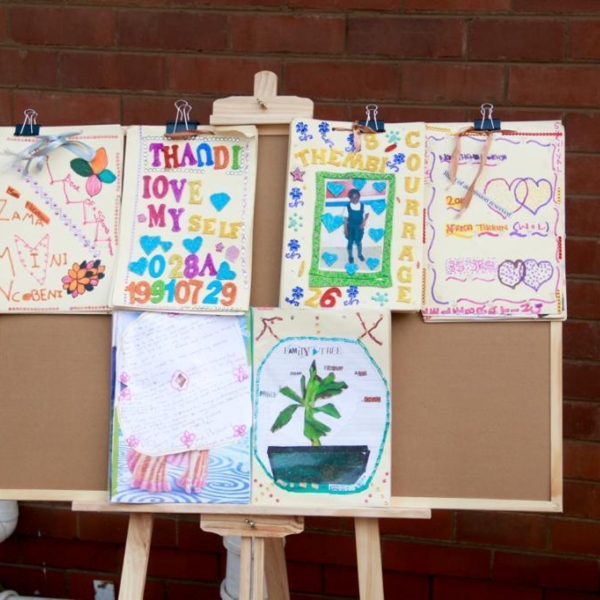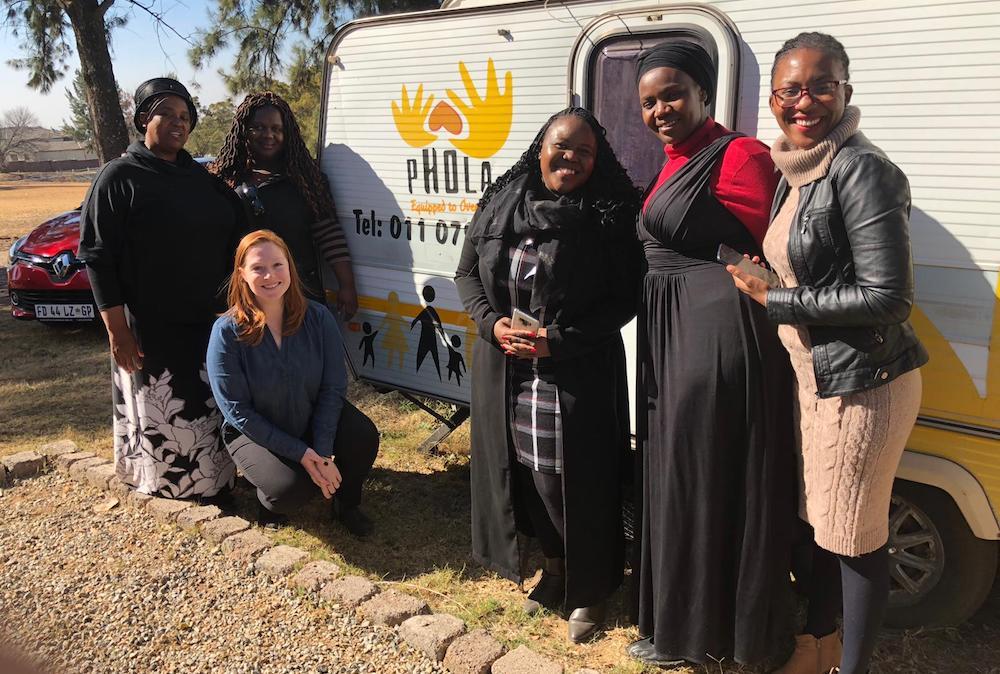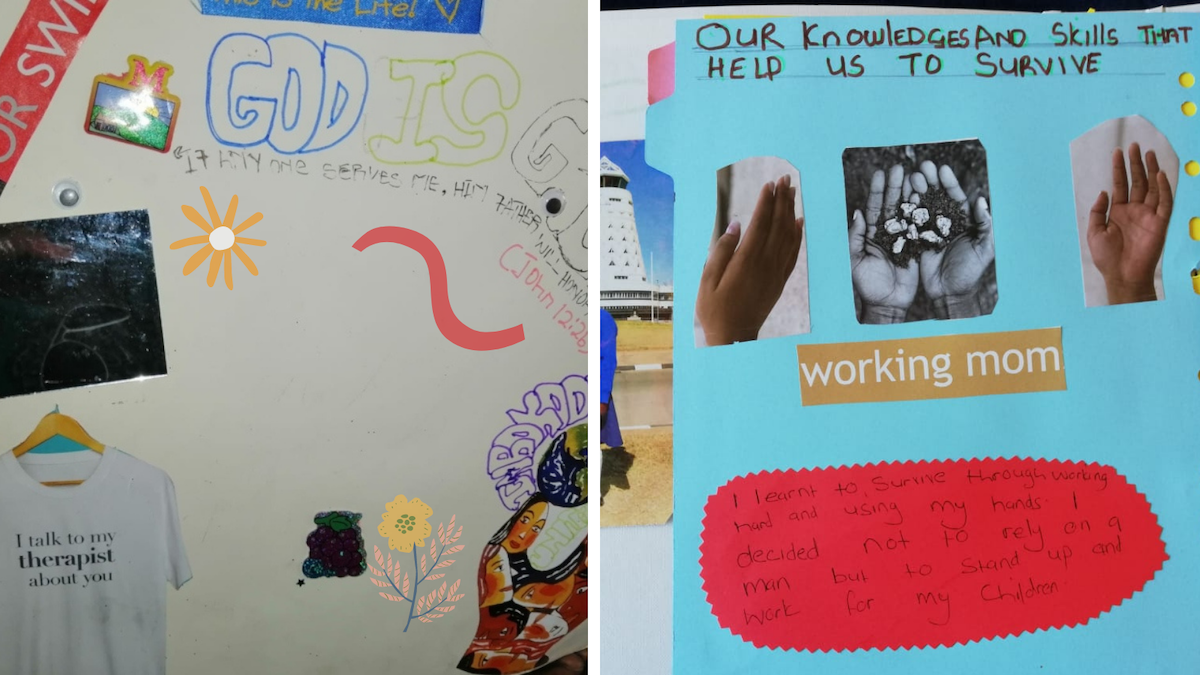
The COURRAGE to change: Tackling Women’s Depression & Poverty Through Storytelling
null
Published on Mar 04, 2021
The COURRAGE to change: Tackling Women’s Depression & Poverty Through Storytelling
null
Published on Mar 04, 2021

Trigger warning: this piece includes references to sexual violence
Community-based organisations have innovative methodologies to support varying mental health needs but often don’t have the resources to evaluate their impact. This poses two key challenges: on the one hand, it can be difficult to secure funding without an evidence base; on the other, it can mean that fewer people and organisations learn about these methods and draw on the insights they provide. What’s more, understanding the impact of mental health interventions can be particularly complicated of how interconnected mental health is to other dimensions of life.
PHOLA is s South Africa-based NGO that provides targeted culturally sensitive psychosocial therapies to address the effects of trauma, violence and abuse in the lives of those affected. We brokered a partnership between PHOLA’s Ncazelo and Dr Rochelle Burgess, a leading community health psychologist, researcher and lecturer at UCL, to conduct an evaluation of one of PHOLA’s key methodologies. This piece, written in collaboration with PHOLA and Dr Burgess, captures the impact of the COURRAGE Plus methodology.
You can read the full paper published in the International Journal of Social Psychiatry here.
The context
Women face higher burdens of depressive disorders given their increased exposure to compounded risk factors including violence, marginalisation and poverty, particularly in the Global South. This intersects with a scarcity of mental health services, with poor individuals, especially women, less likely to be able to access care due to stigma, lack of financial resources, among numerous other factors. Despite gains achieved by the movement for global mental health, significant gaps remain in the provision of mental health support that addresses structural drivers of distress. Interventions addressing symptoms and structural drivers of depression are gravely needed but largely absent in South Africa.
COURRAGE Plus: Using storytelling to develop community alliances to respond to social challenges
In the face of this need, narrative therapist, Ncazelo Ncube Mlilo designed a collective storytelling intervention called COURRAGE. This methodology aims to provide women experiencing complex trauma and hardships with opportunities to reimagine their place in the world. The COURRAGE Plus Methodology includes an additional three sessions, developed in collaboration with University College London researcher Dr Rochelle Burgess, creating opportunities for women to engage with social determinants of mental health, such as poverty, alongside addressing psychological distress.

Delivering COURRAGE Plus in South Africa
The COURRAGE Plus intervention ran for 13 weeks, starting in September 2019, with 47 women participating, all of whom have a child with a disability. The research intervention was delivered through a partnership between PHOLA, Institute for Global Health, UCL, SHM Foundation-UK, the University of Johannesburg and Afrika Tikkun a South African NGO specialising in community support and development for women and children. Participants were women over 18 years of age, service users at Afrika Tikkun, largely mothers of children living with disability, recruited via targeted sampling (via onsite referrals from social workers) and self-referral. Sessions were delivered at four Afrika Tikkun locations, a South African NGO specialising in community support and development of children.
How is COURRAGE Plus unique?
- Creating a safe space by encouraging participants to share positive stories: Every week follows the COURRAGE acronym with every letter having a different topic. The first session was on celebrating survival. Most counselling sessions start with people telling their problem story, whereas this intervention starts with asking women how they would like to celebrate having come so far despite the hardships that they have experienced. During a break in the first session, one of the women shared her story and a few other women said it gives them hope because she looks strong and beautiful, they could not tell that she had experienced so many difficulties. It made them realise that their problems were better than hers. Islands of safety were created in this way and when the time came for them to share their painful experiences, they cried, but supported and encouraged each other.
- Using creative tools of empowerment- a personal and a collective journey: A part of the methodology is for every participant to create a storybook of COURRAGE to document their journey. Magazines and decorative material were given to them to design their storybooks. The women loved doing this and took immense pride in their books.

- Understanding behaviours to create new definitions of positive mental health outcomes: As the weeks went by, personality changes started to emerge. In the Alexander group, a leader arose who would introduce new ways of beginning and ending the group by introducing prayer and songs. Stories about how they were interacting with people differently outside the group were shared, marriages improved, and one woman even stood up to her manager and demanded inclusion and respect. She told him, “Enough is enough!”. In the same group, the new leader introduced aerobics and started discussing low and high points of the week after the sessions.
- Finding solace in each other’s battles - collective empowerment by sharing stories of trauma: One of the participants initially displayed a lot of anger, sometimes also against other women in the group, in the first few weeks of the intervention. The cause behind her behaviour was unknown. Then, a new participant joined in the fourth week, who opened up about how she had been gang-raped while she was pregnant. This was an emotional moment of connect for the other participant who on hearing this story, revealed that she also faced similar violence. The shared stories of trauma helped them connect with each other and opened a pathway to healing.
- The Domino Effect- Better mental health instilled confidence in women to handle their children’s disability: A common theme was that mothers with children living with disability usually kept their children in their homes because of the fear of discrimination from neighbours and friends. The women said they were no longer afraid, they loved their children and wanted them to be free and play outside like other children. The neighbours needed to be educated and not feared.
- Developing Self-Reliance- Collectively Identifying skills and achieving personal goals: The last session of COURRAGE focuses on envisioning the future. Women are asked what their preferred future looks like and what plans they can actively start to work towards their goals. The last three sessions of the methodology were dedicated to planning for the future, learning and leading together and Ubuntu: Collective actions and collective power. The women took what they had envisioned for the future and made action plans; assessments were made on the skills they already have and the skills they still needed to acquire. The women supported each other and identified where there were synergies in their plans and leveraged off each other’s skills. Discussions were also held on who in their communities could assist them with their plans. Some women even created blueprints of the businesses they want to open.

The Impact of COURRAGE Plus
At the beginning of the intervention, PHQ-9 forms were administered to women in order to get baseline evidence of their clinical symptoms of depression. 39 women met the criteria for depression. In the last session, the PHQ-9 questionnaires were administered again, and many women had scores of zero! This means that they showed no clinical symptoms of depression.
Lead researcher Dr Rochelle Burgess of UCL presented preliminary research findings which showed that the COURRAGE methodology had proven to be very effective in reducing the symptoms of clinical depression amongst women who have experienced complex trauma and hardships. The evaluation demonstrated that 65% of women had scores of zero at the end of the intervention pointing to a reduction in depression symptoms in women. At the end of the programme, the team held a graduation ceremony attended by over 160 delegates, including the participants. The graduates took centre-stage during the event, sharing their stories and experiences of the COURRAGE intervention. They sang and danced to celebrate the steps that they had taken to separate from a painful past and their hopes to live new powerful lives.
The women who took part in this intervention felt its impact in more than symptom reduction. Towards the end of the intervention a few of the women found employment. They felt that they learned many lessons, but the most important one was that, while they are mothers who love their children, they themselves are just as important, and they deserve to be happy and taken care of.
"I now have an ability to act when facing problems. I am also able to stand on my own, share with others and I have a dream to change my life and the community I live in."
- COURRAGE Plus participant
You can read the full paper published in the International Journal of Social Psychiatry here.

Contact Us

Have a challenge you think we could help with? A project you'd like us to collaborate on?
Just want to say hi? Reach out - we love meeting new people